Monday Feb 16, 2026
Monday Feb 16, 2026
Monday, 30 November 2015 00:10 - - {{hitsCtrl.values.hits}}
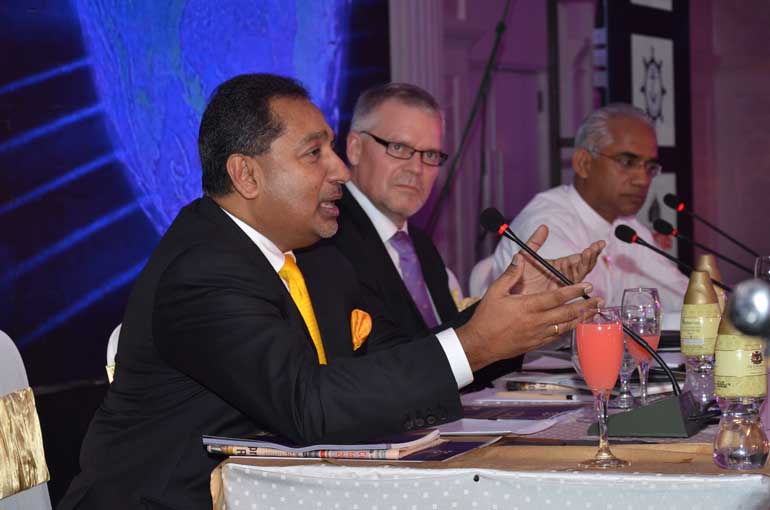
CILT Sri Lanka Chairman Niral Kadawatharatchie, CILT International Vice President Jan Steenburg, Keynote Speaker Deputy Minister of State Enterprise Development Eran Wickramarathne 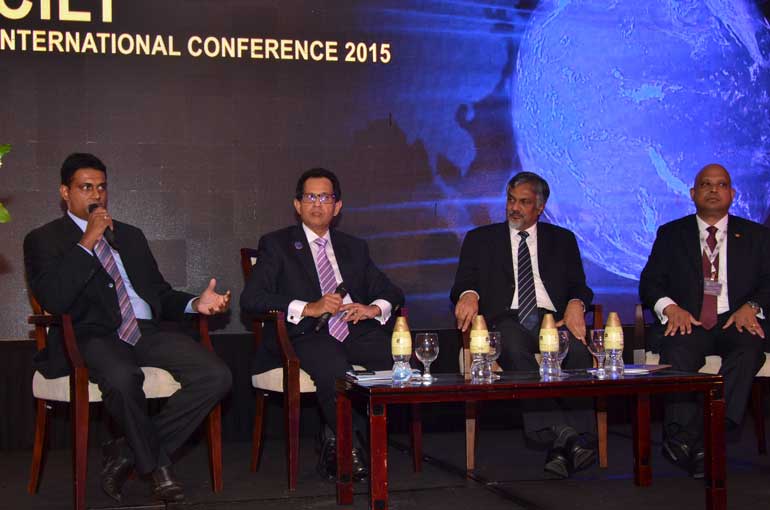
MSC Lines General Manager Kingsley Abeywickrama, Lanka Shipping and Logistics Chairman Saliya Senanayake, CASA Chairman Capt. Ajith Peiris, SAGT Chief Commercial Officer Ted Muttiah
 By Charumini de Silva
By Charumini de Silva
The Chartered Institute of Logistics and Transport (CILT) Sri Lanka hosted its Annual International Conference 2015 amidst a large gathering of industry professionals last week at The Kingsbury Colombo, themed ‘Logistics to Power the World’.
The conference was held under the patronage of State Enterprise Development Deputy Minister Eran Wickramaratne as the keynote speaker, while Finance Minister Ravi Karunanayake was the Chief Guest. Ports and Shipping Minister Arjuna Ranatunga and International Trade State Minister Sujeewa Senasinghe were also present at the conference, while key insights were shared by distinguished professionals in the industry.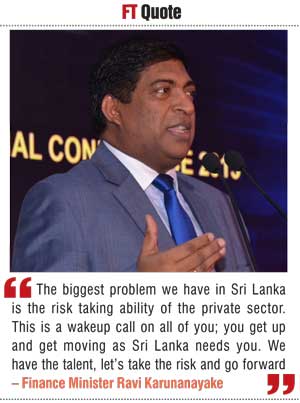
Delivering the opening remarks, CILT Chairman Niral Kadawatharatchie stated: “There is no doubt that the world will not be the same without logistics; in fact it would be hard to imagine a situation where there were no providers of logistics and transport services to manufacturers and end users.”
He went on to say that Sri Lanka holds an important strategic geographical advantage as the country is right at the centre of the maritime silk route connecting the East and West through the Indian Ocean. “We can reap the best advantage of this position by developing our maritime and aviation sectors and improving the infrastructure facilities while enhancing the knowledge and skills of our people.”
However, he raised multiple issues faced by the local shipping and logistics industry such as fast-tracking the proposed transport master plan for Colombo City, doing away with cumbersome Customs procedures and rehabilitating the railway tracks and fast-tracking the rail system electrification program in order to reap the best benefits in the industry.
Noting that the proposed transport master plan for Colombo city is in hibernation, he urged the Government to create a platform to facilitate free movement goods across borders and thereby to do away with cumbersome and lengthy Customs procedures.
Kadawatharatchie said that CILT Sri Lanka has always been at the forefront of meeting these objectives with important contributions towards successful implementation of development projects in the logistics and transport sector.
“We have always strived for environmentally-friendly policies in this area while emphasising on the importance of enhancing the competencies of those involved in this sector. As Sri Lanka plans to reap dividends of renewed economic growth in the Asian region, it’s time for us to find every possible avenue to get greater benefits through efficient logistics solutions,” he added.
Delivering the keynote address on ‘Logistics to Power the World,’ State Enterprise Development Deputy Minister Eran Wickramaratne asserted that the logistics industry was constantly growing in importance and welcomed Sri Lanka investing in and growing its logistics industry, because this is essential for Sri Lanka’s success in the world.
Noting that there is huge potential of the logistics industry driven to an extent by Sri Lanka’s unique geographic position, he pointed that the country needed to capitalise on this potential to increase re-exports from Sri Lanka, which would in turn contribute to our GDP. 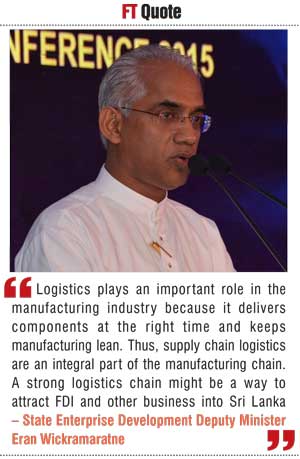
“Logistics plays an important role in the manufacturing industry because it delivers components at the right time and keeps manufacturing lean. Thus, supply chain logistics are an integral part of the manufacturing chain. A strong logistics chain might be a way to attract FDI and other business into Sri Lanka,” Wickramaratne said.
Importance of soft infrastructure
Pointing out that investment in physical infrastructure that has taken place is valuable for the logistics industry in Sri Lanka, and assuring it would continue, the Deputy Minister said it was not sufficient. “To achieve a world-class and efficient logistics system and to compete on a global scale, it is also important to develop the soft infrastructure. That is, we need to invest more in human resources, technology, and the systems that drive the success of logistics.”
Further clarifying his point he asserted that soft infrastructure may often be more important than physical infrastructure for increasing trade and its profitability.
Emphasising that the lack of direct competition between ports controlled by the same Government authority was also a critical factor he added this was an issue that the Government must explore further.
Noting that the Government has an important role to play in developing that soft infrastructure, he however asserted that it was the private sector that should drives the process and flag to the Government the priorities for action.
Electronic document processing
“For instance, the Customs and ports in Sri Lanka need to fully adopt, as a matter of urgency, electronic document processing to increase the accuracy, speed and integrity of the logistics process. Sri Lanka’s soft infrastructure looks archaic in comparison to competing nations, and improving the soft infrastructure is a matter of priority for the present Government,” Wickramaratne added.
Elaborating on the importance of electronic document processing, he said: “We know the term ‘paper trail’ is associated with accountability, but with electronic document processing, you create a more durable footprint that is vital for good governance within the private sector and the public sector. Keeping it electronic helps us to also deal with corruption problems that are endemic in this sector. This is not unique to Sri Lanka.”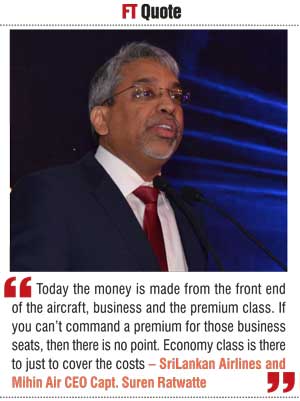
Across the world, many people think that corruption, such as a bribe, can grease the wheels of the system. People in logistics might not think there is a problem in making payments to get things done – something as basic as getting a document. However, in the long term, corruption is also sanding the wheel and preventing progress, he noted.
“For more than 20 years, Sri Lanka has tried to make the transition to electronic processing but people who are beneficiaries of the incumbent system generally block it. As a result, Sri Lanka’s logistics won’t be as competitive on as it could be on the global scale,” he added.
Wickramaratne said that Sri Lanka should look into issues like the role of the Sri Lanka Ports Authority (SLPA) as both a regulator and an operator in terms of competition with the private sector.
“There are a number of Government ministries involved in managing logistics in Sri Lanka. For example, Sri Lanka Ports Authority, the Aviation Authority Sri Lanka, and SriLankan Airlines Cargo all come under different ministries. Is there sufficient coherence in the way the Ministries of Ports, Transport and Public Enterprises operate with regard to Sri Lanka’s logistics?” he questioned.
The Deputy Minister said: “Good governance means that we want to work differently, not on the basis of patronage and favours for a few, but on the basis that we will ‘change the system’ to work in the industry’s favour. That is the basis on which we talk about good governance.”
The Chief Guest of the conference Finance Minister Ravi Karunanayake assured that the Government would take immediate actions to streamline cumbersome procedures and outstanding issues such as recoup costs and difficulty in documentation and others relating to the shipping and logistics industry.
Pointing that the Government was now making efforts to catch up with lost time as a result of the 30-year long war he asserted that continuous efforts are also being made by the Government to create a competitive and dynamic shipping industry in order to be par on with regional players like Dubai, Malaysia and Singapore.
“The new Government under the leadership of President Sirisena and Prime Minister Ranil Wickremesinghe will ensure that Sri Lanka is exploited in the best possible way to make a win-win proposition of making the logistics the way forward,” the Minister said.
He also noted that local shipping and logistics sector will be given real pride of place to develop a Sri Lankan-based strong business operation within the Budget 2016, which was presented in Parliament last Friday (20).
Wakeup call to the private sector 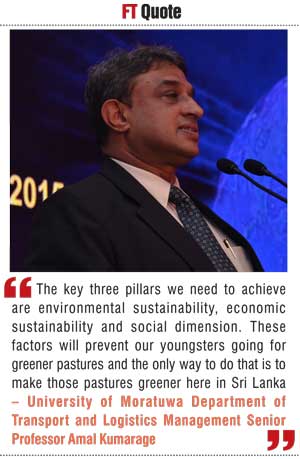
Karunanayake gave a wakeup call to the private sector to take risks, harness and utilise their expertise and talent to fulfil the future growth targets set by the Government. “The biggest problem we have in Sri Lanka is the risk taking ability of the private sector. This is a wakeup call on all of you; you get up and get moving as Sri Lanka needs you. We have the talent, let’s take the risk and go forward.”
He went on to say that Sri Lanka is on the move and logistics is one aspect of it. “We are going to ensure that we make the world look at Sri Lanka as a foreign operation destination. The Government will guarantee that the best of talent will be brought in as the country is keen to use foreign capital with the local knowledge to take the industry forward.”
Karunanayake also highlighted the Government’s plans in the near future for loss making national carrier SriLankan Airlines and added that the company will be restructured to play a pivotal role to capture the best in the region and will be given the opportunity to place themselves among the key players.
Speaking on ‘Why Improving Logistics Efficiency is Paramount for Sri Lanka’s Economic Progress,’ University of Moratuwa Department of Transport and Logistics Management, Senior Professor Amal Kumarage said logistics is paramount import for Sri Lanka’s economic growth.
Noting that logistics is the cement that binds the entire supply chain, he said the process therefore must be efficient. Logistics requires three essential components, infrastructure, different types of equipment (mostly equipment that moves around) and right processes that makes all of these work according to what we want as an end product.
Explaining he stated: “Infrastructure must be developed at the lowest cost to the highest benefit. Unfortunately, the trend in infrastructure planning is just the opposite. We need to change this trend from fancy projects that have big price tags. This requires study and that is why we need to question any Government on any infrastructure project, because we finally pay for it.
He suggested that Sri Lanka needs to look at ‘efficient eco system’ to provide mobility. “It’s no point having efficient port alone, or a public transport system, the entire eco system needs to be efficient.”
Explaining it theoretically, he said: “Imagine you’re producing some product here. We have to be very conscious about our cost component of the logistics. At the same time, if we lose on our cost component, if our competitor is better than us, our market will shrink at double speed. We also need to think of cost of production. If you change the cost of production it’s going to be marginal, but if you change the cost of transport your effect is going to be twofold. In that context, your competitiveness is more based on transportation logistics than on manufacturing.”
What do we get in terms of costing facts?
Highlighting the importance of having a logistic hub that can provide efficient and competitive prices, he stated: “Today, we got to have both cost of production as well as transport and logistic costs low, in fact it is more sensitive than production cost. But on the other hand if we have higher transport and logistics cost, the whole linkage between production areas and the consumption areas can get severed totally. And this is the danger that we have; that we will lose markets not marginally, but we will lose markets altogether.”
If you look at transportation as an economic activity, no transport and logistics is best for our economy.
Noting that he’s still a student in trying to understand the economics behind this he said; “No transport and logistics is best for our economy. The less transport we have the less logistics because it is not something we consume for ourselves. As a consumption item, life will be better off when that is zero. So, we have more time and money to do the things we like to do.”
Citing an example he said that if you look at Singapore, their internal cost of transportation is as low as 4.5%, but they put in a lot of value addition to what is set up, but the waste on that is very little. “Sri Lanka on the other hand have 13% of our GDP represented in transport and I think the value addition is small and the consumption is very high. So, when our GDP in transportation increases that’s no good news.”
Transport is invader of spaces
Prof. Kumarage said transport and logistics is something that affects our daily lifestyles and in fact the future of this country. However, in today’s context transport has become more of a liability than an asset. Therefore, these are some challenging areas which the country needs to make decisions on.
Highways are necessary, but we also need to know what we need highways for. Highways in limited land areas in Sri Lanka, we need to ensure that many people and not many vehicles will use the highway space we have, particularly at peak period times.
“The key three pillars we need to achieve are environmental sustainability, economic sustainability and social dimension. These factors will prevent our youngsters going for greener pastures and the only way to do that is to make those pastures greener here in Sri Lanka. During the year 2014 the country spent about 11% on value of what we do just for mobility, not even logistics. How can an economy be efficient when 11% of our effort is just spent on mobility?” he questioned.
With the kind of infrastructure and equipment we have, for this mobility function if we project that and have more of them, the bad news is that by 2020 that’s going to double. Thus, we need to have a plan which we will have next year and we will make it better after that. We need to have the transport system in operation, I’m talking about land transport mostly.
Looking at the global increase of transport and logistic costs he said it was expanding exponentially, while the GDP percentage is getting smaller by the number as it turns out to be more efficient. “But when we look at Sri Lanka, we are 25 years behind the rest hence, in becoming a global hub we have a lot of catching up to do. I think in moving forward we can a lot from developed countries in terms of lowering and managing our mobility cost,” he explained.
“When the mobility cost decreases, exports will surge, that’s what the Government wants; production will increase, that’s what the manufacturers want; cost of living will decrease, that’s what the people want and theoretically the taxes will be decreased, that’s what we all want!”
Further he said that we have looked at different corridors and what mode of transport is required. We have also looked at different aspects that each of these networks have and we have found the best urban transportation network we can develop as per the 21st century is based on bus transportation because that goes into the fabrics of province, the road network, the quality, 21st century buses which all of us can use, information in our hands, ticketing with cashless, cruise that are mindful of what service passengers require, reliability which you can set by your clock and understanding of what passenger demand is all about and that is the task before us.”
How to get the urban areas moving again?
Sri Lanka needs to ensure that the country has the right mode of transport. “We can’t simply ask suppliers to come and tell us what transport we need. It needs to be considered in terms of cost, usability, affordability and a host of other social, environmental and economic parameters,” he said. “We select quantity against quality, which we need to change.”
He suggested that the remote equipment policy must be revised noting that high private investments are made on vehicles. “We are spending as a country over Rs. 500 billion just buying vehicles. Obviously this is a policy that needs to be reversed. We also have very poor productivity of most vehicles. Most of the vehicles we have are not productively used.”
He also said that the country has also not addressed the quality of public transport, noting that railway is 75 years behind its time, while buses are probably 25 to 30 years behind.
Service delivery
He went on to say that there is very poor customer orientation in transport and logistics and the country cannot become hub unless we are willing to improve on those standards.
“We also don’t have the regulations, which are either absent or obsolete. We should ensure that the Government is set the parameters to the delivery, where the regulation can be a part of. There’s no push from both locals and foreign experts. When Government gets involved in transport, it is politicised, poorly managed, burden to tax payers and there is no market leaderships to mark them leaders for the private sector to follow.”
Thereby he suggested the CILT to take on this as a priority to push for a mobility eco system.
Safer, affordable transport and logistics services
Prof. Kumarage said it was important to inculcate a self-assessment culture to have a safer, affordable transport and logistics service. “We love to copy and paste from overseas; while they are good in their own right there are many solutions that we can adopt accordingly to our problems. This is where countries like the US and EU are spending millions of dollars and euros. We also have oligopolistic pricing in transport where two or three operators are powerful enough to set standards from big players to the three wheeler operators at the junction. We seem to like it, and that’s where inefficiency starts.”
However, he commended the recent action taken by the Government where the Cabinet of Ministers has reconsidered the decision to award the rehabilitation of certain railway lines on bilateral agreements. “There is no shortage of finance in this world today. We need to ensure that there are good standards set for vehicles. Enough is enough! We need much more responsible statement on how we are going to get out from this mess. We must also ensure that we will not go ahead with bilateral agreements with no competitive biddings. It must drive greater efficiency.”
SriLankan Airlines and Mihin Air CEO Capt. Suren Ratwatte speaking on ‘Airline Industry: Challenges and Way Forward’ asserted air transport is a major contributor to the economy, where it has contributed $539 billion in 2014.
Giving a synopsis of the airline industry he said it is just barely coming into 100 years, which is phenomenal as it is the safest way to go anywhere in the world.
Irrational competition
Noting that the airline business has changed dramatically over the years, due to high competition especially from the Gulf airlines, the margins are getting smaller. “We call it irrational competition, from the three sisters in the Middle East – Emirates, Etihad and Qatar. They have cannibalised the market completely. They are now the best airlines in terms of available seats per kilometre by a huge margin. Emirates today is the biggest and these three airlines are adding capacity every day, while adding one destination every month. This has caused an inverse impact on price.”
Noting that the Gulf airlines have economies of scale and the connectivity he said it was difficult to match those prices. “When we try to sell a ticket from Europe through Colombo to Far East we find that Emirates has already the saturated the market with three or four daily flights for better price, making it impossible for us to make money. They also make good money from cargo in those routes. So trying to make a business under these circumstance is a real challenge,” he stressed.
Further elaborating on challenges he said airlines today have to watch the bottom-line, the cost. Finding a niche, whether it is connectivity or ultralow cost, is paramount important to sustain in the market.
“You got to find some niche, because if you don’t you’re not going to survive, because the margins are not high enough to invest in anything.”
He said Emirates has 20% differential between their cost and revenue, while Cathay Pacific has 30% differentials, which is pretty amazing. “These airlines operate so efficiently. On top of that Honk Kong being the banking centre for China, they fill their premium cabins all the time. We have very good costs, much lower than anybody else but the bad news is we just cannot generate the revenue from those seats available. My task is to bring down the cost which is very challenging, but we are trying. Generating revenue is a real challenge, but ask me in two years, I will tell you,” he said.
Future SriLankan
Capt. Ratwatte said that he plans to rationalise all the routes and some of the destinations will be out from the radar for the betterment of the airline. “Today the money is made from the front end of the aircraft, business and the premium class. If you can’t command a premium for those business seats, then there is no point. Economy class is there to just to cover the costs.”
SriLankan Airlines is performing well on the Colombo-London route as it is the only non-stop carrier and the company is earning well as the airline has the capacity to command the premium price for the business class. “We even have business class on Mihin Air now and that’s quite a good product and the routes we fly from Mihin and we see that people are willing to pay that premium on that route.”
He said the airline will rationalise its route network soon. “We will figure out what works for us and enter into code share agreements with partner airline ventures to serve the other routes.”
Noting that it’s high time that the airline should invest into strong points than popular destinations, he added that they have recognised China and South India as two strong promising destinations.
Commenting on invented routes of the airline he noted that Dhaka-Colombo is one of the most profitable routes they have as there is onboard traffic to Male. Dhaka is good not only because of Maldivian workers, but is also good for the apparel trade.
“Dhaka and China are routes that we pretty much invented. We are now pushing daily flight to three major cities in China. China Airline started flying to Colombo non-stop lately and China Eastern as well. We invent the route, we do the work, we create markets. The way air routes work is with the bilateral agreements between the two countries.”
Explaining on the current airline fleet he said it’s got an odd mix for an airline and one of the things they are doing now is getting the right mix of aircrafts. “We are getting new airplanes this year, A330-300s. In fact we are getting one this week and one is coming in January. From next year we are going to decide what we are going to get and it looks like it’s going to be more narrow bodies rather than wide bodies trying to serve our markets in the Far East, especially with daily flights.”
He said the airline is looking forward to increase the frequencies and serve its passengers better by being more flexible.
Currently SriLankan Airlines flies three times to Singapore and two times to Bangkok; with plans to enhance its services, the airline intends to increase it to thrice a day to Bangkok.
In addition the airline is trying to move its ticketing into internet booking agencies in order to offer passengers more flexibility and more choices on what they pay and where they want to travel. “We have understood that ticketing and pricing gets nasty during seasons, where we start off fairly high and depending on the sales we make them more fair prices. It is a very complex way to price things and understand. Hence we are now trying to move into internet booking agencies.”
Potential radar
“We see great potential between Far East and Australia. Between India and Australia we are well positioned to have a decent market share because the European market is cannibalised by the Gulf carriers. Africa, India, Far East Asia and Australia is still open and we want to get in there,” Capt. Ratwatte noted.
Quoting some statistics, he said according to Airbus, Colombo is going to be significant city with more than 10,000 daily passengers reaching 20,000. “Hence, we hope that the new Government would align its policies accordingly to benefit the industry.”
Pix by Bhanuka Kirinde
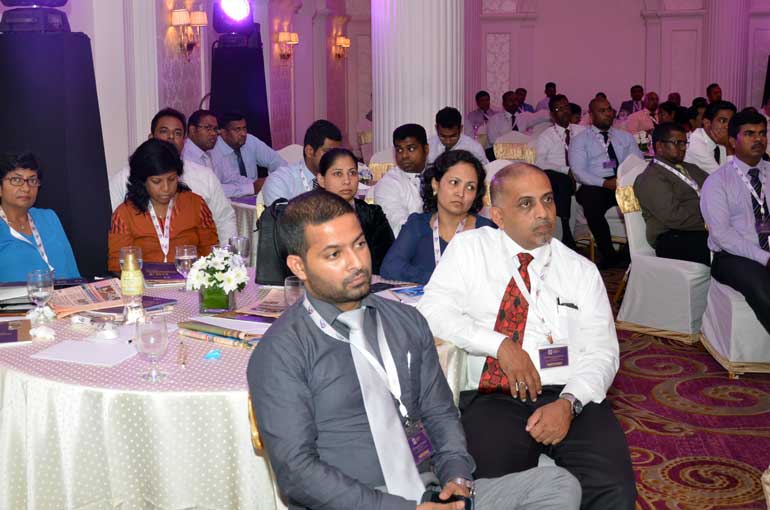
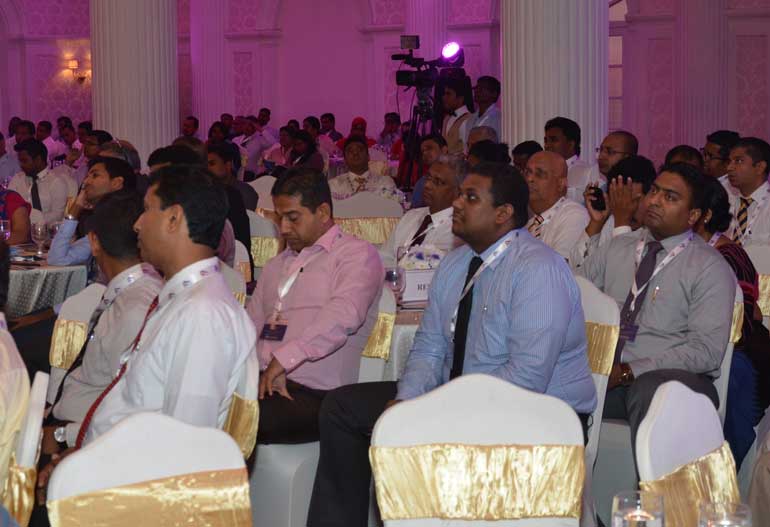 A section of the audience
A section of the audience